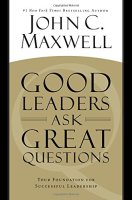
Good Leaders Ask Great Questions by John C. Maxwell

Read the summary below and get the key insights in just 10 minutes!


- Why asking questions matters to leaders,
- What questions leaders should ask themselves and their team members, and
- How to define the most important questions to explore in the field of leadership.

Leaders’ Questions
Leaders must ask questions to develop and grow. This holds true during your first leadership assignments as well as throughout your career. The more questions leaders ask, the more answers they receive. The more answers they receive, the better equipped they become to lead. Never worry about appearing foolish or ignorant when you ask a question. You may be surprised when everyone around you develops more respect for you, not less, because you did the one thing that most leaders are terrified to do: You admitted that you don’t know everything.
“Though many of us try to make ourselves look smart by giving clever answers, we would be much better off if we focused our attention on asking questions.”
Motivational speaker and self-help author Anthony Robbins explains, “Quality questions create a quality life.” Questions are important to leaders for eight primary reasons:
- “You only get answers to the questions you ask” – Asking questions and heeding the answers is the path to self-education. Don’t worry that asking questions may make you look stupid. As Sharper Image founder Richard Thalheimer said, “It is better to look uninformed than to be uninformed.” The search for answers begins with a question.
- “Questions unlock and open doors” – Expose hidden information by asking inquisitive questions about a topic.
- “Questions are the most effective means of connecting with people” – Direct well-chosen questions to the people who are best qualified to answer.
- “Questions cultivate humility” – King Solomon described himself: “I am only a little child and do not know how to carry out my duties.” Adopt a similar humble attitude.
- “Questions…engage others in conversation” – Great talk-show hosts, for example, use questions to get a discussion rolling.
- “Questions…build better ideas” – The more people comment on an idea, the stronger it becomes. Solicit feedback by asking questions.
- “Questions give…a different perspective” – Inadequate information fuels faulty assumptions. Ask people to share their perspectives.
- “Questions challenge mind-sets” – The right questions open new worlds of “discovery and innovation.”
Questions Leaders Ask Themselves
Socrates said, “The unexamined life is not worth leading.” An amendment to his point of view might assert, “The unexamined leader is not worth following.”
John Wooden, the UCLA Bruins’ legendary former basketball coach, developed seven questions you can ask daily to check your progress as a leader. Give honest, objective answers:
- “Am I investing in myself?” – No investment will ever be more important to your development. Your self-investment determines the return you receive from your work and life. Believe in yourself with full confidence.
- “Am I genuinely interested in others?” – Great leaders prioritize the people they lead over any leadership framework. The people they lead know their leader can say yes to such questions as “Can you help me?” “Do you care for me?” and “Can I trust you?”
- “Am I grounded as a leader?” – The Romans staged giant parades to honor their most successful generals, who rode in chariots while everyone cheered. A slave stood behind the general being honored, positioning a laurel wreath over his head to acknowledge the leader’s recent victory. The slave also would whisper to the general, “Hominem te memento.” Meaning, “remember, you are only a man.” Leaders must never think they are better than those they lead.
- “Am I adding value to my team?” – Coach Wooden would ask himself, “How can I make my team better?” Search out your personal answer daily. To improve your team, encourage and support your people.
- “Am I staying in my strength zone?” – To reach your full potential, concentrate on building on your strengths, not on improving your weaknesses.
- “Am I taking care of today? – Leaders must be visionaries who are prepared for the future, but they also must focus on the day at hand, when everything takes place. Strive to make each day your best.
- “Am I investing my time with the right people?” – Pay attention to the people on your team, especially those with the potential to become leaders. Select your team members according to their traits and abilities, such as the capacity to grow personally and professionally, strong values, good character, and so on.
Questions for Team Members
The questions you ask your team members are crucial to their self-development. The right questions enable them to dream, improve their focus, educate themselves, concentrate, become more productive and grow. Their answers give you information about them and their work that you can’t find elsewhere.
Ask team members these 11 questions:
- “What do you think?” – Understand and leverage your team members’ thoughts and experience. Asking them for their ideas breeds loyalty.
- “How can I serve you?” – Demonstrate your care for your team. Expressing concern draws people to you.
- “What do I need to communicate?” – Show your employees that you recognize you are not infallible; supply any missing information once you discover where your team members might be confused.
- “Did we exceed expectations?” – Win others’ approval by going above and beyond their stated wishes.
- “What did you learn?” – Stop and think about your experiences. Urge your team members to evaluate what they’ve been through.
- “Did we add value?” – Help other people realize their full worth and potential. Show them their value.
- “How do we maximize this experience?” – Get the most out of every development you experience.
- “What do I need to know?” – Mine the knowledge bases and perceptions of those around you. Trust what you hear.
- “How do we make the most of this opportunity?” – One open window can lead to another. The people who are directly involved have the best sense of what may follow.
- “How are the numbers?” – Never take metrics for granted. All organizations need the right numbers to gauge their progress. Sound numbers show how you are faring against your competition.
- “What am I missing?” – What you don’t know can hurt you.
Questions People Ask
Research, extensive analysis as well as careful categorization indicate the need to ask and answer important, practical and useful leadership questions. In order to develop and enhance your leadership skills and potential, consider the following questions and your likely answers:
- “Why does leading myself seem more difficult than leading others?” – Most people have blind spots when it comes to analyzing themselves. People judge themselves by their intentions, but they judge others by their actions. Common blind spots include thinking that you’re always right or always putting yourself first. Once you identify your weak spots, ask your friends and family to help you eliminate them.
- “What are the most important values for a leader?” – Start with “servanthood.” Great leaders serve others. Servant leaders strive to develop strong relationships with those around them and to renew their energy. In a tough, demanding world, such replenishment is crucial.
- “What is the most effective daily habit for any leader?” – Give more to others than you get from them. Work on this with one person at a time. Function with a giving mind-set, and people will love to work for you. Effective givers answer these questions: “What have you been given?” “What do you have?” and “What can you do?”
- “What is the ultimate purpose of leadership?” – The purpose of leading is to assist others, build something, be considerate and improve those around you. To accomplish those goals, become a good listener. Make others’ wishes your priorities. Help people develop plans to achieve their goals. Demonstrate your belief in them.
- “What are the top skills required to lead people through…difficult times?” – Define the hard realities you and your employees are facing together. Keep them in touch with the big picture. Develop an extrication plan for the problems you face. Make the proper choices. Stress the value of teamwork. Provide hope.
- “How do you determine your leadership potential?” – Start with the needs you identify as requiring leadership. Are you passionate about solving problems? Put your natural abilities to work to fix things. Extend and leverage your personal and professional influence. Contribute, so the world benefits from your leadership.
- “How do you [balance] leading others and producing?” – Many young leaders spend more time doing – and producing – than leading. People become leaders because they are productive, yet leaders who can’t delegate don’t work efficiently. Don’t try to do everything yourself. Give others an opportunity to do – and to grow.
- “How do you motivate an unmotivated person?” – You can’t change how people think and act. Hire and associate with motivated individuals. Recognize them by their constant positive attitude. They have goals they can describe. They initiate action. They are notably successful.
- “How does one lead people who are more knowledgeable?” – Experts won’t follow you for your title or position. Pulling rank won’t work. To get their cooperation, isolate the most influential person and humbly request help. Ask, “Can I come to you for advice? When I need to make a decision for the team, can I talk it over with you? I know that with your help, we can all be successful.”
- “How can you succeed with a leader who is difficult?” – Start by being realistic. No matter what you do or how hard you try to get along, things may not work out. Consider all potential outcomes. As you communicate with this person, make sure you can back up your opinions with facts. Understand that despite your best efforts, you may have to take a job somewhere else.
- “When is the right time for a successful leader to move on?” – Before you take any dramatic action, ask yourself if you have given your current job your best shot. Are you trying to get away from something you don’t like, or is your motive to move to something more exciting? Can you be patient and wait for a promising opportunity? If your analysis indicates that it’s time for you to move on, don’t dillydally. Start your new future immediately.
- “What…principles enable a failed leader to lead again?” – Fix any lingering problems that compromised your leadership. Be honest and transparent as you work to re-establish trust with those around you.
- “What is the best way to identify leadership potential in others?” – Look for effective catalysts, strong influencers and relationship builders. People with leadership potential are opportunistic, add value to others and finish what they start.
- “How can you help people to achieve their maximum potential?” – Assume the role of a coach or mentor. Provide a compelling vision for the future. Make sure your team members are in the best position to score big wins.
- “What should be the legacy of a successful leader?” – Famed political writer Walter Lippmann explained that a leader “leaves behind in others the conviction and will to carry on.” You will know you succeeded as a leader when it becomes clear that your people can continue successfully when you’re gone. Your greatest legacy as a leader will be the leaders you developed who will emulate your good work and your positive, collaborative, helpful and humble attitude.
Becoming a better leader is a never-ending process. Your personal development demands constant growth. To grow and develop, great leaders ask themselves and those around them endless questions. Even when no answers appear, asking makes leaders better.[/text_block]






